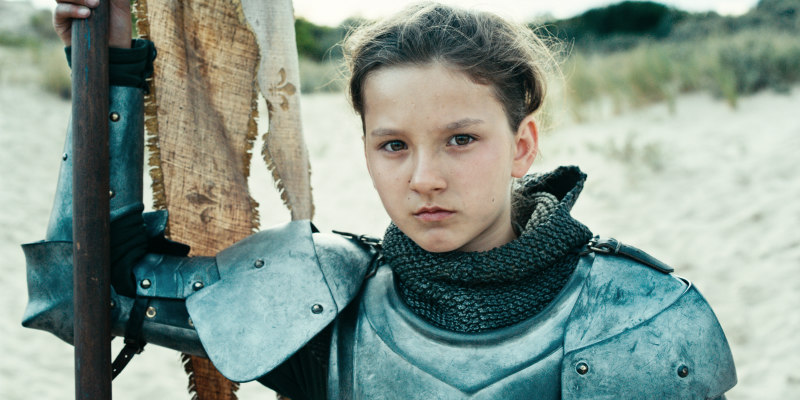
Review by
Benjamin Poole
Directed by: Bruno Dumont
Starring: Lise Leplat Prudhomme, Jean-Francois
Causeret, Daniel Dienne, Fabien Fenet, Robert Hanicotte, Yves Habert, Fabrice Luchini

Bring back Jane Wiedlin.
At what point in Joan of Arc - Bruno Dumont's sequel
to his own
Jeannette: The Childhood of Joan of Arc,
a historical drama which depicted the Maid of Orléans' earlier, funnier
years to Joan of Arc's representation of the latterly canonised Roman
Catholic saint's trial at the hands of partisan religious eggheads -
do you give in to the heart sinking sensation that you, as a person who
loves films and as a critic (!) who wants to evaluate the best of what you
see, are actually watching a deeply boring and really quite misguided
movie?


There are clues from the off. We see little Jeanne (Lise Leplat Prudhomme) having a bit of a pray in the film's opening. The scene is set up really oddly: Jeanne is supplicating behind a hedgerow on a country path, like those annoying people who stop and check their phones on narrow country lanes when you are out walking the dogs. The scene looks ad hoc, inexpert. Perhaps, you think, perhaps Dumont is making the aesthetic point that religious worship can be quotidian and not necessarily dramatic. The score is all leery though, even at this point, doing some heavy lifting to imbue gravitas… Still, the costumes are great. And surely there will be kilometrage in the northern French countryside (Wissant, here), a bleak and sketchy landscape which always photographs with beautiful ennui.
[ READ MORE: New Release Review - Beau is Afraid ]
It is hard, though, as the story continues, to think of an uglier film. It
must be deliberate, this anti-style which Dumont utilises throughout the
unforgiving 137 minute running time (I too now know how these martyrs
suffered…), which is essentially made up of people talking at each other.
The way in which scenes are blocked, with characters, usually a trio, set at
different points within the completely static frame - one at the foreground,
the middle, the back; all facing the camera while intoning dialogue drier
than the kindling used to eventually burn someone at the stake - is
spiritless. Again, you give the film the benefit of the doubt, reasoning
that this approach is a Brechtian dynamic which encourages logical
consideration of Jeanne's doctrinal/divine plight. But, by Christ, is it
boring to sit through.


It's sort of like watching a Radio 4 play about what happened to Joan of Arc: I mean, you can’t fault the clerical detail of the dialogue, which cleaves to the dry verisimilitude of real-life litigation. It does convince as the sort of expansive back and forth which you've always imagined higher up church bods indulging in. I closed my eyes and tried to experience the film that way before realising my French wasn't up to it, and anyway, the cast make no attempt to do more than recite the script, with no emotional cadence or dramatic intonation. I reopened my eyes and the actors were still there, unmoving in their strange triagonal formations. A character even acknowledges the verbosity when they comment on "prodigiously eloquent" discussions… If you say so, camarade.
[ READ MORE: New Release Review - Under the Fig Trees ]
Except there are these weird moments which, if they do not make up for the
static longueurs, then at least seem like attempts to inject some sort of
visual interest into the film. Viz. an early battle scene where, to the beat
of an insistent tattoo, we get a tight shot of Jeanne's horse's trotters.
The animal starts moving back in forth in time to the music: the horse is
actually dancing. In lieu of a battle, there is this (poorly executed, it
has to be said) pseudo-symbolic dressage sequence. From epic theatre to this
badly sweded version of Monty Python and the Holy Grail in a
misguided furlong. Once or twice characters also
do-whatever-the-opposite-of-burst-is into song, miming to the lachrymose
chanson of Gallic popstar Christophe (RIP). Problem is, this is somehow more
interesting in print than it actually is rendered upon the screen.


For a film about a character who, by all accounts, was determined and completely focussed on her mission, Joan of Arc is all over le shop. The central location of the Rouen Cathedral is inevitably stunning: but couldn't the set dresser have removed the incongruously modern looking safety gate which guards a certain pillar? It is a tough watch, yeah, but our sympathy should be reserved for Leplat Prudhomme. Her performance is rich in potential, and if her dignified cherubic presence cannot save the film then it at least keeps the faith throughout. But even she is let down ultimately by Dumont, who directs her to recite her lines at a consistently strained, shouty pitch from where there is nowhere else for the actor to go in this already aimless film.
Passionless.

Joan of Arc is on MUBI UK now.
